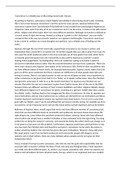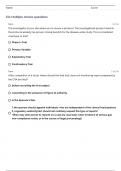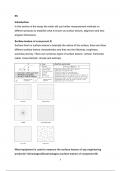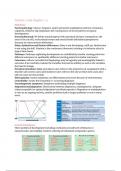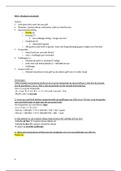‘Conscience is a reliable way of discerning moral truth’ Discuss
According to Aquinas, conscience is both helpful and reliable in discovering moral truths. However,
this is not correct because conscience is not the same for every person. Aquinas believes that
conscience is given from God whereas Freud believes it was created from psychological experiences.
If Aquinas’ ideas were true why all of our consciences aren’t are the same, in issues to do with sexual
ethics, religion and other topics there are many different opinions. Although conscience is defined as
‘a moral sense of right and wrong, viewed as acting as a guide to one’s behaviour’, you can easily
compared this to the way our parents raised us, our opinions and thoughts. Conscience seems just
to be a word to combine our moral thoughts and opinions, not a reliable way of finding out the
truth.
Aquinas, through the use of the word ratio, argued that conscience is our reason is action, and
emphasised that a moral life is an action one. He further argued that our ratio is given from God. He
also used the word synderesis which is the inner principle we all have given from God, which turns
us towards good and away from evil. Conscientia is also used by Aquinas as a person’s reason
making moral judgements, he distinguishes this from synderesis saying conscientia is taken in
account for individual actions rather than the overall inclination we have from synderesis. There are
three main reasons why Aquinas’ description of the conscience fails, firstly he does not address why
we have different ideas of moral truths, for example homosexuality. Aquinas clearly states that God
gives us all the same synderesis but there is always an indifference of what people deal right and
wrong in society. There is no logical answer to why we do not all agree on basic moral questions so
either conscience is not given from God or it is ‘faulty’ so to speak. Furthermore, does the Christian
God give the same type of ratio to us as the Jewish God does? As Aquinas was Christian we can
assume that when he says our conscience is given from God he means that of the one in the Bible,
however there are different versions of ‘God’ is Islam, Buddhism and other religions. Beliefs change
from different religions so if consciences are given according to a persons’ beliefs then they cannot
be reliable. Lastly, I believe Aquinas has exaggerated his idea of conscience, he tries to separate our
moral inclinations and our moral actions but our actions are derived from our inclinations and ideas.
It seems Aquinas is just trying to rename our opinions and moral stances. For we act in a way that
goes with our beliefs, even if we do something that we know is morally wrong, for example we lie to
our parents, we do it because we do not see this moral action as that important and can be broken.
Believers of Aquinas’ ideas, would argue that we do not have different versions of consciences but
more that we have different levels of conscientia and synderesis. Everyone knows deep down the
right thing to do, some follow this and their synderesis follows, whereas those who have different
moral truths may simple have a smaller inclination or less motivated to do the right thing. Focusing
synderesis on being the same for everyone, and conscientia being the action which can change as it
is not given to God sorts out this problem. Furthermore, Aquinas would have said that there is only
one true God, the Christian God, and therefore everyone’s conscience can be and is the same no
matter what they believe, the real God has given the same inclinations. However, these still seem
like weak points, even if we had both synderesis and conscientia, people still disagree on the
opinions not on their actions, there are many debates where people just do not agree on their
fundamental ideas.
Freud, instead of trying to prove conscience, asks why we feel the guilt and responsibility that we
associate with conscience without the idea of God and using psychological ideas. Freud separates
our minds into three different parts, id, which is our chaotic animalistic side, where we express our
desires and inclinations for basic physical needs, the ego, which is our organised and more realistic
According to Aquinas, conscience is both helpful and reliable in discovering moral truths. However,
this is not correct because conscience is not the same for every person. Aquinas believes that
conscience is given from God whereas Freud believes it was created from psychological experiences.
If Aquinas’ ideas were true why all of our consciences aren’t are the same, in issues to do with sexual
ethics, religion and other topics there are many different opinions. Although conscience is defined as
‘a moral sense of right and wrong, viewed as acting as a guide to one’s behaviour’, you can easily
compared this to the way our parents raised us, our opinions and thoughts. Conscience seems just
to be a word to combine our moral thoughts and opinions, not a reliable way of finding out the
truth.
Aquinas, through the use of the word ratio, argued that conscience is our reason is action, and
emphasised that a moral life is an action one. He further argued that our ratio is given from God. He
also used the word synderesis which is the inner principle we all have given from God, which turns
us towards good and away from evil. Conscientia is also used by Aquinas as a person’s reason
making moral judgements, he distinguishes this from synderesis saying conscientia is taken in
account for individual actions rather than the overall inclination we have from synderesis. There are
three main reasons why Aquinas’ description of the conscience fails, firstly he does not address why
we have different ideas of moral truths, for example homosexuality. Aquinas clearly states that God
gives us all the same synderesis but there is always an indifference of what people deal right and
wrong in society. There is no logical answer to why we do not all agree on basic moral questions so
either conscience is not given from God or it is ‘faulty’ so to speak. Furthermore, does the Christian
God give the same type of ratio to us as the Jewish God does? As Aquinas was Christian we can
assume that when he says our conscience is given from God he means that of the one in the Bible,
however there are different versions of ‘God’ is Islam, Buddhism and other religions. Beliefs change
from different religions so if consciences are given according to a persons’ beliefs then they cannot
be reliable. Lastly, I believe Aquinas has exaggerated his idea of conscience, he tries to separate our
moral inclinations and our moral actions but our actions are derived from our inclinations and ideas.
It seems Aquinas is just trying to rename our opinions and moral stances. For we act in a way that
goes with our beliefs, even if we do something that we know is morally wrong, for example we lie to
our parents, we do it because we do not see this moral action as that important and can be broken.
Believers of Aquinas’ ideas, would argue that we do not have different versions of consciences but
more that we have different levels of conscientia and synderesis. Everyone knows deep down the
right thing to do, some follow this and their synderesis follows, whereas those who have different
moral truths may simple have a smaller inclination or less motivated to do the right thing. Focusing
synderesis on being the same for everyone, and conscientia being the action which can change as it
is not given to God sorts out this problem. Furthermore, Aquinas would have said that there is only
one true God, the Christian God, and therefore everyone’s conscience can be and is the same no
matter what they believe, the real God has given the same inclinations. However, these still seem
like weak points, even if we had both synderesis and conscientia, people still disagree on the
opinions not on their actions, there are many debates where people just do not agree on their
fundamental ideas.
Freud, instead of trying to prove conscience, asks why we feel the guilt and responsibility that we
associate with conscience without the idea of God and using psychological ideas. Freud separates
our minds into three different parts, id, which is our chaotic animalistic side, where we express our
desires and inclinations for basic physical needs, the ego, which is our organised and more realistic

